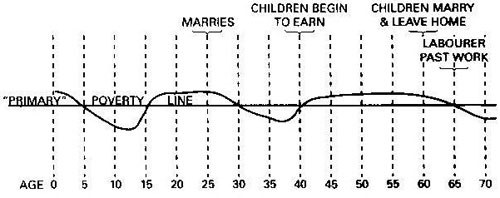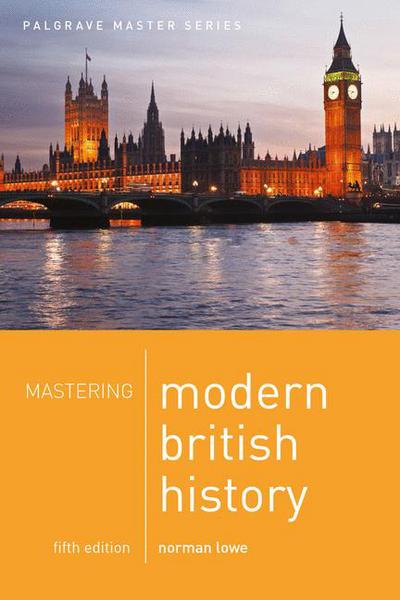


Are you sure you want to reset the form?
Your mail has been sent successfully
Are you sure you want to remove the alert?
Your session is about to expire! You will be signed out in
Do you wish to stay signed in?
Poverty and self-help
Study Sources A to F and then answer the questions that follow.
Source A: A diagram and some of the findings from Seebohm Rowntree's investigation into poverty in York, first published in 1901.

Every labourer who has as many as three children must pass through a time, probably lasting about ten years, when he will be in a state of ‘primary’ poverty; in other words when he and his family will be underfed...
The wages paid for unskilled labour in York are insufficient to provide food, shelter and clothing adequate to maintain a family of moderate size in a state of bare physical efficiency - a diet less generous than that allowed in the York workhouse. No allowance is made for any other expenditure. A family like this must never spend a penny on railway fare or omnibus. They must never buy a newspaper or a ticket for a popular concert. They must write no letters to absent children for they cannot afford to pay the postage. They cannot save, nor can they join a sick club or trade union. The children must have no pocket money for dolls, marbles or sweets. The father must not smoke or drink beer.
Source: S. Rowntree, Poverty, a Study of Town Life, Nelson, 1914 edn.
Source B:
| An investigation into poverty by Arthur Ponsonby, 1910 The following is authentic information based on actual facts: Man of ‘no occupation’. Married. Two rooms; two children; parish relief; ill; incapable. Two little girls, one consumptive. The rooms are miserable, badly ventilated and damp. This house shares one closet with six other houses, and one water tap with three others. Another man of ‘no occupation’. Married. Two children. Four houses. The London house has 62 rooms and there are 36 indoor servants. Source: A. Ponsonby, 'The Camel and the Needle’s Eye', 1910, quoted in D. Read (ed.), Documents from Edwardian England, Harrap, 1973. |
Source C:
| A letter written in 1897 I have known Mrs D---- for ten years and have found her to be a thoroughly honest woman from a respectable family. But what with bad trade she was nearly brought to starvation some time ago, and I try as often as I can to help her. My father and some more of the citizens of this dilapidated town got up a Relief Committee and we started a Bread and Tea Fund for the winter months. Source: Quoted in P. Keating (ed.), Into Unknown England, Fontana, 1976. |
Source D:
| From a book by Helen Bosanquet published in 1902. It still remains true that the strength of the people lies in its own conscious efforts to face difficulties and overcome them. ‘Difficulties to overcome, and freedom to overcome them,’ is an essential condition of progress for human beings of whatever position in life. Any class or any individual which is either unconscious of difficulties, or unable to make the effort to master them, must stagnate and ultimately deteriorate.... the real solution will rest in the hands, or rather the minds of the people most nearly affected. If they cannot be made to care for it and seek for it, it can never be given to them from outside....We can do much on the one hand to provide opportunities. Freedom from self-indulgence and from tyrannous appetites and blind vacancy can only be attained by the interests which draw a man out of himself; and these he will find largely in the difficulties which he has to overcome in life, and in the education which we put within his reach. Freedom from excessive toil can only come from economic improvement; and that can best be attained by raising a larger number to the ranks of skilled workers. But the one thing to avoid in all our work, whether legislative, social or personal, is the risk of diminishing the saving interests in the life of an individual or a class by doing for them what they could do for themselves. Source: H. Bosanquet, The Strength of the People, Macmillan, 1902, quoted in Read, as Source B. |
Source E:
| The view of Lord Hugh Cecil, a Conservative MP, in 1912. Care for the rights of property must take precedence over social reform. It is plain that to take what one man has and give it to another is unjust, even though the first man be rich and the second poor. The state should help the poor only for reasons of charity; but I am sure that the poor have no right to assistance. The cruel state that leaves a man to starve does not actually injure him. The only question is, does it withhold from him something to which he is entitled? I find it hard to agree that it does. Source: Quoted in Read, as Source B. |
Source F:
| Extracts from a speech by Lloyd George, the Liberal Chancellor of the Exchequer, at Limehouse, 30 July 1909. This Budget is introduced for raising taxes that will bring forth fruit.... provision for the aged and deserving poor - it was time it was done. (Cheers.) It is rather a shame for a rich country like ours - probably the richest country in the world - that it should allow those who have toiled all their days to end in poverty and possible starvation. (Hear, Hear.) It is rather hard that an old workman should have to find his way to the tomb through the brambles and thorns of poverty. (Cheers.) There are many in the country blessed by Providence with great wealth, and if there are amongst them men who grudge out of their riches a fair contribution towards the less fortunate of their fellow-countrymen, they are shabby rich men. (Cheers.) We are raising money to provide against the evils that follow from unemployment. We are raising money to provide for the sick and the widows and orphans.... I do not believe any fair-minded man would challenge the justice and the fairness of the objects which we have in view in raising this money. Source: Quoted in J. H. Bettey (ed.), English Historical Documents 1906-39, Routledge & Kegan Paul, 1967. |
